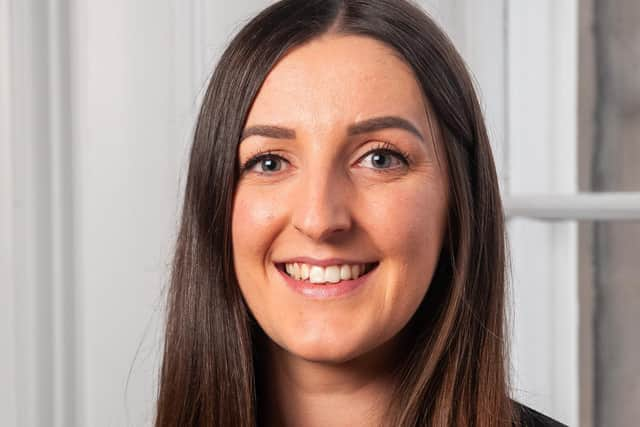Whether you get married or form a civil partnership, your rights are almost identical - Melissa Strachan
Other than the main and obvious answer of the title of the relationship, we have prepared a helpful factsheet on the minor differences in Scottish law:
How they begin: A civil partnership is formed by signing a contract, and a marriage is formed by the exchanging of vows and then the signing of a marriage certificate.
Advertisement
Hide AdAdvertisement
Hide AdThe type of ceremony: A marriage ceremony can be a religious or civil ceremony, whereas a civil partnership is entirely a civil ceremony.


How they end: A civil partnership is brought to an end by a dissolution of the civil partnership and a marriage ends by divorce.
The grounds for dissolution and divorce: The grounds for both a dissolution and divorce are the same: (1) either party has obtained an interim gender recognition certificate during the civil partnership or marriage or (2) irretrievable breakdown of the partnership or marriage. However, “irretrievable breakdown” is established in different ways dependent on whether you married or entered into a civil partnership:
For married couples, it can be due to:
- Unreasonable behaviour;
- Adultery;
- two years’ separation; or
- One year of separation with the other spouse’s consent.
For civil partners, it can be due to:
- Unreasonable behaviour;
- Two years’ separation; or
- One year of separation with consent.
Adultery is not a ground for dissolution of the civil partnership given its legal definition, although, if a partner has been unfaithful then that would come under unreasonable behaviour.
The public’s view: A civil partnership is viewed as a more contemporary option to formalise matters should a couple choose not to marry for religious or other personal reasons. This fits with the introduction of civil partnerships in Scotland for same sex couples in 2005 and the introduction of civil partnership for heterosexual couples in 2021.
Beyond this, there are very few differences and legally, the rights of married couples and civil partners are almost identical, both during the relationship, on dissolution or divorce and on death. For example:
Claims on separation: Both civil partners and spouses can make claims for ongoing financial support and for a fair sharing of the couple’s wealth on separation.
Claims on death: Both can make a claim on the death of the other for a share of the deceased’s estate, whether or not there was a Will in place.
Advertisement
Hide AdAdvertisement
Hide AdTax: broadly speaking for tax purposes civil partnerships and marriages are treated the same.
Applying for a dissolution or divorce: Both require the submission of an application to the court.
The types of dissolution and divorce: Both have the option of (1) a “DIY” or “simplified” dissolution or divorce if the financial matters have been agreed and there are no children of the relationship under the age of 16 or (2) using the fuller court procedure called the “ordinary” procedure.
Relationship contracts: Both civil partners and spouses can enter into a relationship contract setting out what is to happen should they separate. This is called a pre or post-nuptial agreement for spouses and a pre or post-partnership agreement for civil partners: the “pre” agreements are entered into before the marriage or civil partnership and the “post” agreements are entered into during the marriage or civil partnership.
So, although they are two distinct types of legal relationship recognised by the law in Scotland, the rights that civil partners and spouses have are nearly identical. Whether a couple wishes to enter into a marriage or civil partnership is down to their personal preference.
Melissa Strachan is a Senior Solicitor, Gillespie Macandrew